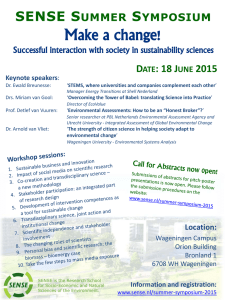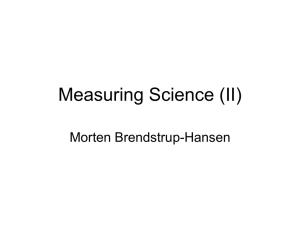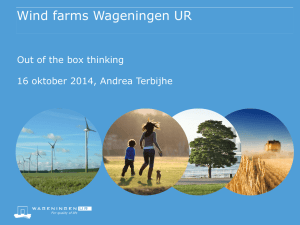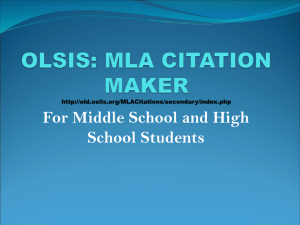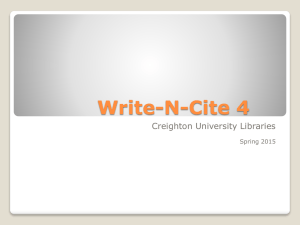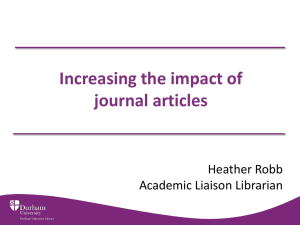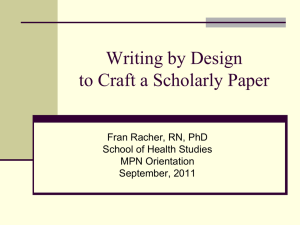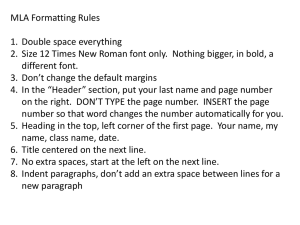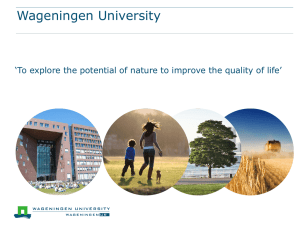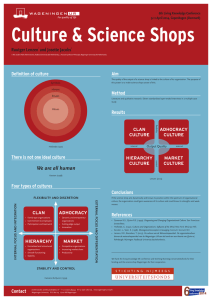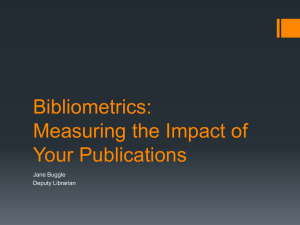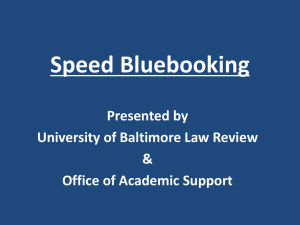Bibliometrics in the library
advertisement
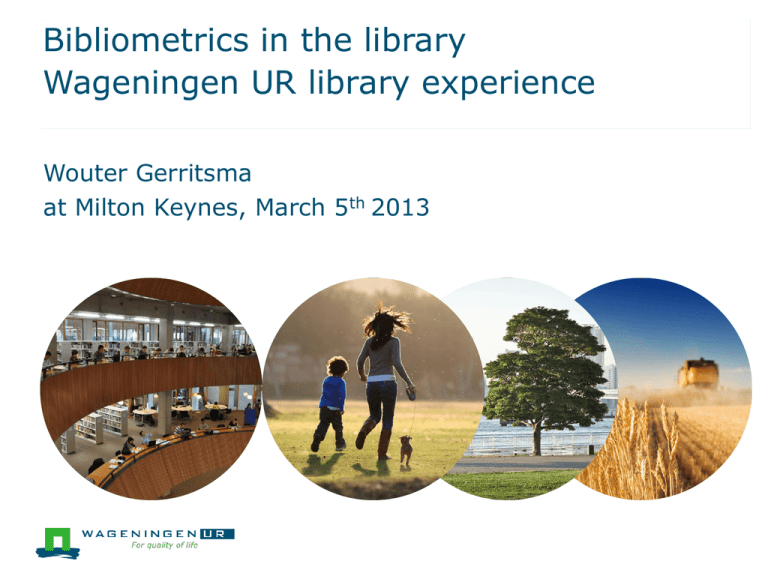
Bibliometrics in the library Wageningen UR library experience Wouter Gerritsma at Milton Keynes, March 5th 2013 Contents Research Evaluation in the Netherlands CRIS & Repository @Wageningen Bibliometrics module Research questions Developments in the marketplace Lessons learned Some advice Research assessment in the Netherlands Supervised by VSNU/QANU ● 6 year cycle for external peer reviews ● After 3 year midterm review ● Unit of analysis (in Wageningen): Graduate schools Citation analyses are not stipulated in the current Standard Evaluation Protocol (SEP). ● This has become mandatory at Wageningen UR, als at the social sciences department and for the research institutes SEP criteria quality (including international academic reputation and PhD training) productivity (the relationship between input and output) societal relevance (including valorisation) vitality and feasibility (the ability to react adequately to important changes in the environment). Metis, our CRIS Metis is a Current Research Information System (CRIS) Data entry at chair group level Quality control by the library ● Locating full text (uploading to e-depot) ● Maintenance journal lists ● Document type assignation and inclusion of DOI's Compulsory output registration ● Research assessments only on metis registered publications Information on all labour relations of faculty and staff Information on all projects Repository or Institutional Bibliography? Wageningen Yield (WaY) is the repository of Wageningen UR ● Synchronized overnight with the updates from Metis ● WaY contains metadata descriptions of all Wageningen UR publication output, >190.000 items ● WaY is our OA repository, >40.000 items ● WaY is our tool for citation analyses, >22.000 publications ● Advanced bibliometrics Full screen image with title How do we compare numbers Scientist Z. Math has a publication from 2002 with 17 citations Scientist M. Biology has a publication from 2008 with 32 citations Baselines for Mathematics Baselines for Molecular Biology For a single publication Zee, F.P.v.d., G. Lettinga & J.A. Field (2001) Azo dye decolourisation by anaerobic granular sludge. Chemosphere 44:1169-1176. ● Citations from WoS: 94 Journal: Chemosphere Categorised by ESI in Environment/Ecology Baseline data for Environment/Ecology. ● Article from 2001 in Environment/ecology: ● On average: 19.36 citations; ● Top 10%: 44 citations; Top1%: 141 citations Relative Impact: 94 / 19.36 = 4.9 van Veller, M.G.P et al. (2010). Bibliometric analyses on repository contents for the evaluation of research at Wageningen UR. In: Qualitative and Quantitative Methods in Libraries: Theory and Applications. A. Katsirikou and C. H. Skiadas. p.19-26. http://edepot.wur.nl/7266. Example of results The actual publications and their impact are provided Research credits report (partly) Slice and dice any way you want Advanced bibliometric indicators Follow Moed (1995) as closely as possible; but..... Web of Science is used for citation data ● We can’t make corrections for self citations Essential Science Indicators for baseline data (World average, Top 10% and Top 1%) ● Limited number of research fields (22) BUT: We can determine the representativeness of the citation analysis! Representativeness Publication type Refereed articles #Pubs 324 Non-refereed articles 7 Books 1 Refereed book chapters 36 Non-refereed book chapters 13 PhD Theses 45 Conference papers 137 Total Academic Publications 563 Representativeness Publication type Refereed articles #Pubs WoS 324 Non-refereed articles 7 Google Scholar 1 Refereed book chapters 36 Non-refereed book chapters 13 PhD Theses 45 Conference papers 137 Total Academic Publications 563 Repr. 288 89% Prospective versus Retrospective analyses CWTS performs normally Prospective analyses ● Current researchers, 10 years back ● Missing some retired bigshots! You need to keep track of the actual publication record for retrospective analyses. This is difficult for external parties. ● Head-tail problems No research on differences in outcomes of prospective versus retrospective analyses ● We need research in this area! Self citations CWTS performs corrections for self citations Correcting for self citations in Web of Science is incomplete ● As long as the RsearcherID is not fully introduced this will be impossible in WoS Correcting for Self citations in Scopus is possible Belgian research has shown that it has not a tremendous influence Glänzel, W., K. Debackere, B. Thijs & A. Schubert (2006). A concise review on the role of author self-citations in information science, bibliometrics and science policy. Scientometrics, 67(2): 263-277 http://dx.doi.org/10.1007/s11192-006-0098-9 Some observations on commercial analytical tools Web of Science Citation data (you can include citations from other databases on Wok) API to download citation data Baselines from ESI InCites more advanced, but where do you manage the information? Author disambiguation is a major problem Scopus Citation data obtainable through an API Benchmarking with SciVal Strata, no API yet Not yet fully developed, major changes coming up. CWTS monitor So far the most elegant and comprehensive citation analysis tool (still in beta) to be launched soon. Citation database agnostic! Google Scholar Very popular by social scientists and arts & humanities Have you ever retrieved more than 1000 results from any Google product? Google Scholar can't count Harzing's Publish or Perish software does a decent job. Altmetrics Quickly developing ● ScienceCard ● Total-Impact ● Readermeter ● Microsoft Academic Search ● etc. We look into inclusion on top of the WaY for article level metrics Wouters, P. & R. Costas (2012). Users, narcissism and control. Utrecht, NL: SURFfoundation. http://www.surffoundation.nl/ en/publicaties/Pages/Users_narcissism_control.aspx. CRIS and Bibliometric analysis tools If you maintain a CRIS, why should you maintain your researchers and organisation structure in a bibliometrics analysis tool as well? Do commercial packages have ways to publicize the results for scrutiny by the researchers? Lessons learned Matching Wageningen Yield and WoS 1161 peer reviewed articles not in ISI journals Missing in WoS: 1159 articles WaY: 10933 articles WoS: 9577 articles Missing in Way: 807 articles It is a lot of hard work to keep track of all publications. The library can a should do a better job than commercial service providers Journal selection and impact @WUR Why in the library? Library is the functional manager of Metis / WaY because of wide experience with bibliographic metadata Library manages contracts with publisher(s) of external databases that are being used Library has experience in developing and maintaining large databases Library has ample experience in searching complicated databases such as Web of Science Advantage of using Metis / WaY Improvements in publication lists, etc. recorded Knowledge of, and experience with bibliometric analyses is better institutionalized More visibility through Open Access management Clarity / transparency for researchers Analysis of a single unit within the institute offers advantages for the organization as a whole Better understanding of our own researchers ● We know where they publish ● We know what they cite ● We know something about their impact Raising library awareness Improvement of the (metadata) quality in the repository Quality has lead to compulsory registration for research assessments Presentations for research groups during the preparation for peer reviews Presentations based on detailed studies of single groups Library gives advice on elements for publication strategies for groups and individuals ● there is a huge demand for these workshops Closing the circle My advise Start small, gain experience Show you can pull it off Be transparent! How much is your university spending research evaluations? Invest those resources in your own systems Thank you http://viaf.org/viaf/285392263/ http://orcid.org/0000-0001-7274-0698 http://wu.academia.edu/WouterGerritsma http://www.researcherid.com/rid/A-4161-2008 http://www.mendeley.com/profiles/wouter-gerritsma http://www.researchgate.net/profile/Wouter_Gerritsma http://scholar.google.com/citations?user=3iDBE-MAAAAJ http://academic.research.microsoft.com/Author/34373815 http://www.narcis.nl/person/info:eu-repo/dai/nl/33714253X
